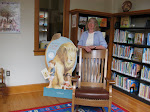Writing sucks! People who think it’s easy haven’t written a
300 page novel, only to have to tear three quarters of it out and start again.
And the problem isn’t throwing out all those beautiful pages. The problem is,
knowing which ones to keep and which ones to throw out. A novel is like an ever
evolving life form. Except in this case, the author is trying to decide who’s
the fittest and who isn’t. If they are wrong, then that’s a year and 200 pages
into the trash. And it’s start all over again!
That’s
why I love authors. Because no one in their right mind would torture themselves
this way unless they had a story they just had to tell. Authors give me hope that it’s possible to go
back to a manuscript every day, beat myself over the head a little more, and
still have a story that won’t go away, that has to be told.
Grant
writing – although not nearly as glamorous, fun, or high profile, is a lot the
same. First, it is an incredible amount of work. Second, you need to really
believe it what every project you are trying to get money for is worth the
effort. Third, you send the grant out into the world unsure if it will be
accepted. And then when it is, you realize that’s only the beginning of all the
work coming your way.
When
ever I get a grant accepted, my first thought is yippee, and my second thought
is “oh crap, now I’ve got to do the work!” So, here’s my number one rule for
getting a grant – make sure it’s something you love and want to do. Hence, the
reason the library received a grant from The Bernard Carl and
Shirley Rosen Library Fund of the Community Foundation of Tompkins County to hold a
series of fantasy author visits.
I’ve now
spent hours/days/weeks making all the arrangements with authors, the school,
travel arrangements etc. etc – but the fun is almost ready to begin. We have
four fantasy authors coming this fall. They’ll spend a day at either the Homer
Intermediate, the Jr. High or the High School. Then they’ll do a writing
workshop for youth here at the library, followed by an evening program open to
the whole community.
So here’s the
lineup:
Frederic
Durbin, author of The Star Shard will
be here Thursday, Sept. 27th
Laura Ruby,
author of The Wall and The Wing and Bad Apple will be her Wednesday, Oct. 17th
Julie Berry,
author of The Amaranth Enchantment
and The Rat Brain Fiasco will be here
Friday, Nov. 2nd and 3rd
Tamora Pierce,
author of Trickster’s Choice and Terrier will be here Wednesday, Nov. 7th.
Check the library
calendar and the Fantastical
Worlds page for an exact schedule. All writing workshops will be held at
4:00 pm and are free, but space is limited so pre-registration is required. All
students who participate in a writing workshop will receive a free copy of one
of the author’s books and be able to post their own stories to the Fantastical Worlds Wiki. So
come to the library for a fantastic fall and help support those people who do
the hard task of telling stories for us!

